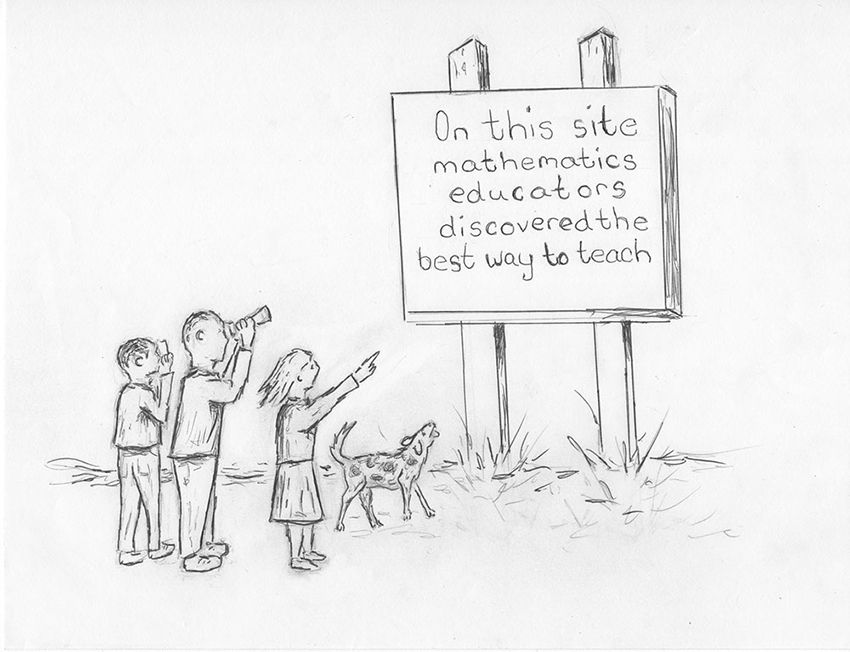
Changing Isn't Failing
During my first year of teaching—when I was thrown into a classroom on a day’s notice as an emergency hire—I used to think to myself, “I can’t wait until I’ve been doing this for 10 years and really know what I’m doing.”
Although I grew more confident in my practice, I finally realized that I was never going wake up one morning to declare, “Yep, I’ve done it. Now I know how to teach.”
I’ve been thinking a lot about this lately. In my role now, much of my time is spent in presentations and workshops around the country talking with educators about rethinking entry-level mathematics programs. For example, I often discuss the benefits of co-requisite course models that help underprepared students succeed in college-level mathematics courses.
During these conversations about co-requisites, it is not unusual for people to look at me with exhaustion in their faces and frustration in their eyes, saying things like:
“Five years ago, we were told to implement modularized computer labs.”
“We just redesigned our dev ed courses.”
“We’re already working on a new boot camp.”
And the next statement is usually, “And now you’re telling us to do something different. Again.”
For many, part of that frustration is the feeling that all their previous work is wasted, unappreciated, and viewed as a failure.
Change Never Stops
I understand that feeling. Too often, the need for change is framed in terms only of what we have failed to accomplish, with no recognition of what we have done well. This approach, instead of motivating change, can be demoralizing.
Change is hard. Change takes time. Change takes us out of our comfort zones.
So it is easy to understand why people yearn for some reassurance or guarantee that this is IT, the last big change, the thing that will finally work.

And that’s part of the problem. There seems to be an assumption that someday we will discover the one right answer to the challenge of helping students learn and succeed.
Human learning is one of the most mysterious and least understood natural phenomena in the world. We can launch spacecraft to study other planets, but we cannot fully explain how human beings learn.
To add to this complexity, the needs of society, technology, the workforce, and our students themselves are changing at an ever-increasing rate. Is it surprising, then, that we must constantly adapt our education structures and practices as we continue to learn how best to serve our students? Being open to the idea of continuous improvement is vital to the continuous growth and success of our endeavors.
Think about other complex fields. The discovery of penicillin dramatically increased rates of survival from infection. But doctors and medical researchers did not all do a high-five and say, “This is it – this is the best we will ever do!”
The flying buttress was an architectural breakthrough, but architects didn’t look at the Notre Dame Cathedral and declare that there was no need for further innovation in their field. The cars of the 1950s were effective at getting people from point A to point B, but as I enjoy the air-conditioning, power windows, and improved gas mileage of the car I drive today, I am very glad that engineers didn’t decide to stop innovating.
Changing our Attitudes (About Change)
The problem in education is not that we keep changing.
The problem is that we experience change as an externally imposed—and sometimes arbitrary or accusatory—process that is separate from our usual way of doing things.
But change doesn’t have to feel alien. When continuous improvement becomes part of our culture, it stops feeling so burdensome. Well-designed structures and processes can make continuous improvement part of our everyday work.
Of course, we will always face challenges—complex issues to wrestle with, too much to do in too little time—but, in a culture of continuous improvement, those challenges can be better addressed, better understood, and better managed. Perhaps most importantly, we can shift our perception from “we have to change because we failed” to “we continuously improve because we are continually learning.”
Back in 2011, the Dana Center hired me specifically to lead the development of one-year mathematics pathways for colleges. This innovation was designed to tackle two problems: the “leaky pipeline” of developmental mathematics courses and the misalignment of content with students’ interests and goals.
I put a lot of blood, sweat, and tears into that work. And it paid off. Students in those courses were more likely to be successful compared to those taking more traditional courses, and they reported higher rates of engagement and interest in mathematics.
So, imagine how it felt to see the evidence that the one-semester co-requisite model is even more effective for many students. I was skeptical about early results, but the data kept coming. And then I got excited, because here was evidence that we could build on our previous work and make it even better by employing co-requisites. We could help even more students than we had before.
Embracing the Idea of Continuous Improvement
If I’m being honest, I felt a little sadness about letting go of my some of my work. But I never felt that my work was a failure or a waste of time.
We acted on good information, and we helped students succeed. Our work contributed to the body of knowledge and the culture shift that made co-requisites possible.
And finally, we’re modeling what we tell others, asking ourselves, “What have we learned from our previous efforts that we can apply as we move forward?”
We must continue to contribute to, and learn from, the collective knowledge in the field, and we must also continually improve our work. In ten years, will we be advocating for the same specific practices that we are today? I certainly hope not. If we are, that means we have become wedded to one idea rather than committed to doing what is best for students. It would mean that we had stopped learning.
When I look in the eyes of the all hard-working educators who are so tired and frustrated, I want so much for them.
I want them to be supported in their work.
I want them to have the resources they need.
But more than anything, I want them to know that they have not failed. I want them to take pride in the fact that they are part of a field that is continually learning, continually improving, and asking every day, “how can we do it better?”
About the Author
Amy Getz
I am the product of three generations of teachers on one side of my family and three generations of ranchers on the other. From the former, I inherited a passion for reading and a tendency to question everything. From the latter, an appreciation of hard work, nature and the contributions that people in all walks of life make to the world. The result is a love of learning and a burning desire to change the world that has fueled my 28-year (and counting) career in mathematics education.
Get in Touch
How can the Dana Center work with you to ensure that our nation's students are ready for postsecondary education and the contemporary workforce?

